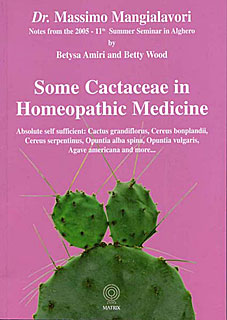Mangialavori describes how Cactaceae can help certain patients to live the last moments of their life in a dignified manner. Although these patients were too sick to expect recovery, their mental and physical condition improved sufficiently for them to take their leave in a peaceful way.
In this book, Mangialavori sketches a more complete picture of the Cactus remedies, which have so far been thoroughly underrepresented in our literature. He describes Cereus serpentinus, Opuntia vulgaris, Opuntia alba spina, and Agave americana, among others.
The chapters each start with a short description of the botanical plant family. Then Mangialavori picks out the characteristic elements of the Cactaceae as homeopathic remedies by presenting the basic themes of this remedy group. The distinctive thing about Mangialavori's work is the precision and care with which he extracts information from the repertoire of strictly defined, healed cases. This book is no exception. With the help of his vivid and memorable cases, we can gain a deeper understanding of these remedies. An exceptional contribution to the homeopathic literature.
Absolute self sufficient: Cactus grandiflorus, Cereus bonplandii, Cereus serpentinus, Opuntia alba spina, Opuntia vulgaris, Agave americana and more …
Deutsche Ausgabe
The publisher:
Through his work as physician, Mangialavori discovered that the Cactaceae are uniquely suitable to help certain patients face their final moments of life with grace and dignity. Although too ill to hope for cure, these patients are able to feel better physically as well as resolve emotional issues and achieve a deeper appreciation of life. Mangialavori gives us a new perspective on such homeopathic medicines as Cactus grandiflorus, and Cereus bonplandii and paints a fuller picture of some of the Cactaceae remedies that are wholly under-represented in our literature such as Cereus serpentinus, Opuntia vulgaris, Opuntia alba spina, and (not a Cactaceae, but sharing the fundamental themes) Agave americana.
 Wishlist
Wishlist





